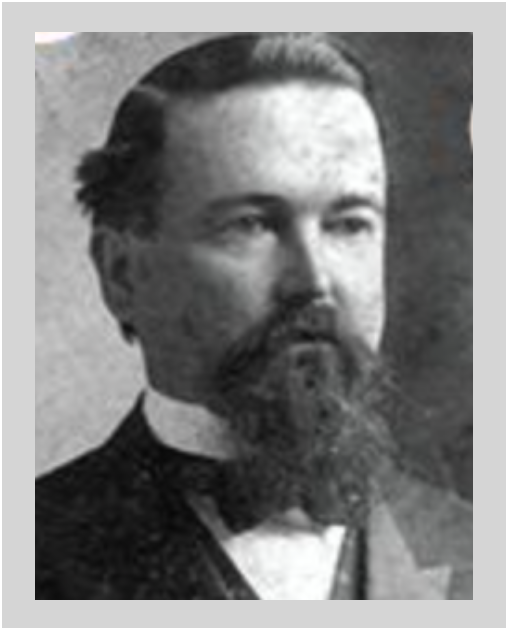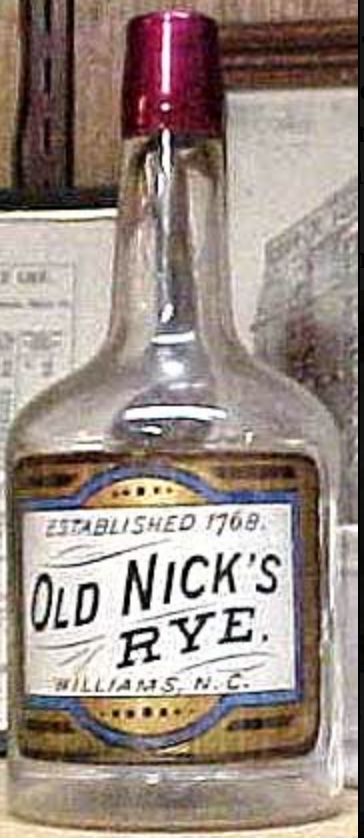Nicolas Glen Williams
“Founder of Old Nick Williams Distillery”
Nicholas “Glen” Williams was born on March 28, 1865, in Yadkin County, North Carolina, into a family steeped in frontier history and industry. His Welsh ancestor, John Williams, had already worked the land and established a distillery into a recognizable whiskey brand 150 years earlier. Glen’s early life was, then, always built around the farm and distillery: planting, harvesting, and learning which corn and rye made a whiskey that could travel without souring or spoiling. The Williams operation had access to large acreage and an agricultural scale that set it apart from small stills; that abundance allowed the family to produce at volumes that drew attention beyond county lines. By the late 1800s, Glen was taking a local product and making it public-facing: he carefully rebranded operations, expanded facilities, and renamed the product in a way that made it memorable. His flagship brand, “Old Nick,” (a play on his own name), paid homage to a rough-hewn Americana that sold well in both rural and urban markets.
On May 26, 1896, Glen married Mary Margaret Hollingsworth, and the marriage became both a personal anchor and a social institution. The couple continued to reside in the corner-to-corner log cabins built by his father and grandfather, adding rooms as necessary to accommodate their thirteen offspring, though unfortunately, several children died at birth or as toddlers, as was common for the era. The household was, nevertheless, always busy with domestic labor and the logistical choreography of a working farm that doubled as an industrial-size distillery. The Williams home served as both family hearth and practical headquarters for an operation that was trying to reach the broader American market.
By 1900, Glen had moved the distillery to a larger, more modern facility and began marketing even more aggressively, showcasing “Old Nick” products at major expositions such as the World’s Fair in Chicago and other nineteenth-century showcases where American regional products sought national buyers. The distillery’s label, a farm-born spirit with a rowdy nickname, found customers in city bars and in high offices; there are suggestions that Williams’ whiskey found admirers as high as presidential circles and civic leaders who appreciated a robust, corn-forward spirit with an easy finish.
Unfortunately, success brought sharper attention from a state still struggling from the financial strain of the Civil War. Taxes assessed on the so-called “angel’s share” that every cooper must account for threatened to swallow margins. Glen pushed back. Local reports and later oral histories recall him lobbying and litigating over unfair tax practices that treated lost barrels as taxable inventory; his arguments contributed to the slow reshaping of policy about how excise taxes were applied to aging spirits. That fight, part business instinct, part legal apprenticeship passed to him by lifelong practice, became a noteworthy subplot in the Williams story and one reason their family remained firmly engaged in public affairs until Prohibition.
The late 19th and early 20th centuries were ripe for expansion for any distillery willing to fight for its position—better railroads, growing urban markets, and a culture that increasingly commodified regional specialties. Yet before long, the moral reform currents and the machinery of temperance ultimately reached deep into the nation’s psyche and its economy. Worse still, North Carolina passed restrictive laws in the early 1900s that limited the legal sale of whiskey some 15 years before National Prohibition arrived, and the Williams enterprise soon began to feel the squeeze.
Very untimely, Nicholas Glen Williams died suddenly on November 25, 1913, at the age of only forty-eight, a young death, even in an era of hard living and inadequate medical care. His young widow was left with a 1,400-acre farm to operate, 28,000 gallons of now “illegal” whiskey, and nine children to raise, the youngest of which was only 2½ years old at the time. Once Prohibition was enacted nationwide, Mary Margaret had no choice but to destroy the remaining whiskey and shut down the distillery for good.
Twenty-odd years later, once the national ban on alcohol ended and the Great Depression had finally concluded, several of Glen Williams’ sons attempted to reestablish “Old Nick Williams Distillery” in Virginia. However, unable to secure the needed funding and unwilling to risk family land, the idea was soon abandoned. The Old Nick brand was then lost to history until 2014, when brothers Van and John Williams and their grown sons, Zeb and Matt Williams, decided to move forward with their dreams and resurrect the whiskey of their ancestors.
In the end, what is learned from the short, often turbulent and even tragic life of Nicolas “Glen” Williams is that he was a giant gentleman farmer, a brilliant entrepreneur and marketer, and the father of an enormous family who stewarded a regional craft through commerce and political pressure and into the national spotlight. Above all, his story traces a pattern familiar to many American business histories: local success evolves into industrial scale, then runs up against social regulation, and finally returns to the market in new, often sentimental forms. For the modern “Old Nick Williams” brand, Glen’s century-old tinkering and travails provided the scaffolding for a revival that would let twenty-first-century drinkers taste a renowned whiskey whose recipe was once the talk of county fairs as well as capital corridors.
Sources:
Old Nick Williams Distillery/Our Story, oldnickwhiskey.com
FamilySearch, Nicholas Glen Williams, Sr. (1865–1913). ancestors.familysearch.org
Find A Grave, Nicholas Glen Williams, Sr., findagrave.com
PBS North Carolina Weekend, “Old Nick Williams Distillery”, Season 20, episode 14, April 13, 2023
Spotlight on Business, “America’s Most Forgotten Distillery”, Anita Flowers
Those Pre-Pro Whiskey Men, “Old Nick…”, October 4, 2013
Contributed by Tracy McLemore, Fairview, Tennessee





